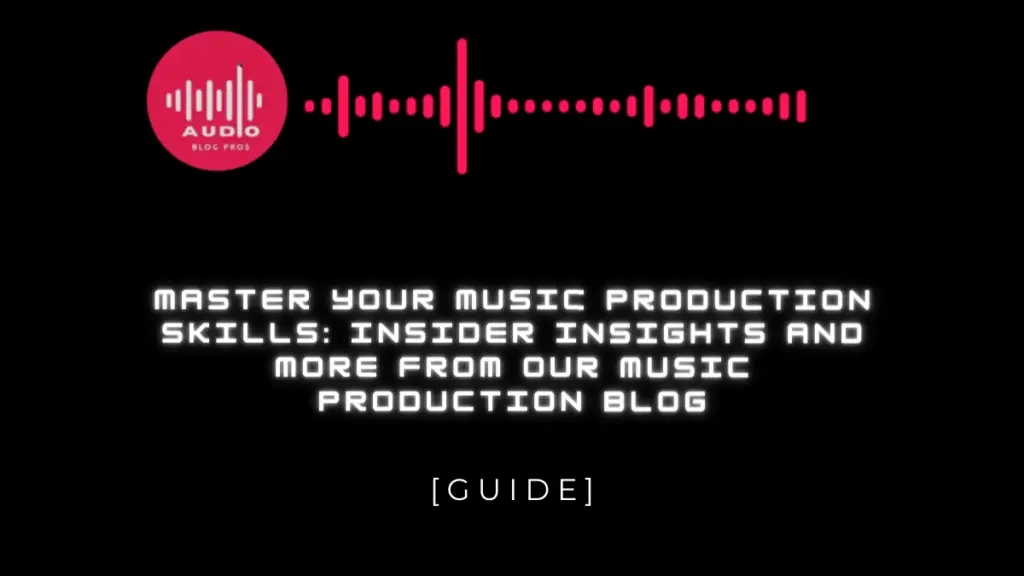Have you ever wondered what it takes to create a chart-topping hit? Do you love music production but struggle to make your tracks stand out? Look no further. Our music production blog has gathered insider insights and expert tips from the industry’s top producers to help you master your music production skills.
This post will share some of our best-kept secrets that can take your music from mediocre to masterpiece. Get ready to unlock the key to crafting memorable melodies and creating a unique sound that sets you apart from the competition. Let’s dive in!
Table of Contents
The Top 5 Music Production Techniques Used by Professionals
Music production techniques are constantly evolving, and it’s important to stay up-to-date with the latest trends. However, there are some tried-and-true methods that have stood the test of time. One of these is layering sounds. Layering involves adding multiple sounds together to create a more complex and interesting sound. Another technique is compression, which helps to even out the levels of different parts of a track and make it sound more polished.
EQing is also crucial in music production, as it allows you to adjust the levels of different frequencies in a track. Other important techniques include sidechaining and reverb, which can add depth and space to your tracks. By mastering these techniques, you can take your music production skills to the next level and create professional-quality tracks that stand out from the crowd.

How to Improve Your Mixing Skills: Tips from Industry Experts
Mixing skills are an essential part of the music production process, and understanding how to improve them can make a huge difference in the quality of your final product. One tip from industry experts is to focus on balancing levels and frequencies early on in your mix, using EQ and compression as needed. Another important aspect is knowing when to use effects like reverb or delay to add depth and dimension without overcrowding the mix.
It’s also crucial to keep in mind that every element should serve a purpose, so consider removing any unnecessary tracks or instruments that aren’t contributing anything significant. Take frequent breaks while mixing sessions, as this helps maintain a fresh perspective throughout long hours in front of the computer.
Don’t be afraid to experiment with panning techniques, stereo imaging tools, or automation for added movement.
Finally, it’s worth noting that while technical proficiency is paramount for successful mixing skills development, having an ear for music transcends anything else – listening critically during all stages of mixing lets you know where changes need implementation.
Mastering for Beginners: A Step-by-Step Guide
If you’re new to music production, mastering can be a daunting task. It’s the final stage of the production process, and it can make or break your tracks. But fear not, because we’ve put together a step-by-step guide to mastering that will help you achieve professional-sounding results.
Firstly, start with proper gain staging by ensuring none of your tracks are hitting red on the meter. Next up is EQ balancing where you’ll have to find an optimal balance between frequency ranges using equalization tools such as lowpass filters and high shelfs meticulously.
Compression comes next in line; this tool balances out different frequencies and dynamics in the sound. Multiband compressors, like any other compressor type but they tend to work more selectively on specific frequency bands rather than applying compression across an entire signal.
The last stage involves stereo imaging and limiting where you adjust how wide (or narrow) your track sounds mono/stereo-wise and ensure its overall loudness without clipping/distortion among others
Remember that each song has its unique requirements during mastering; but following these techniques is going to give a solid foundation for learning more advanced ones later on!

Timeless Trends in Music Production and How to Apply Them Today
Music production has been evolving since its inception in the 1960s. The trendsetters of that era have now become legends, inspiring generations to come. Despite this evolution, there are certain timeless trends that still apply today.
One such trend is the use of analog equipment for warm sound and natural distortion. Many producers believe that digital recording lacks character and depth compared to analog recordings. However, it’s worth noting that digital tools have made significant advancements in recent years.
Another timeless trend is the importance of good songwriting. Regardless of how technically advanced a production may be, if the song behind it isn’t strong enough, it won’t resonate with listeners. In fact, some producers prefer minimalistic productions to let the song shine through.
Finally, collaboration is key in music production. Working together with other artists can help create unique sounds and bring fresh ideas to a project.
By combining these timeless trends with modern techniques and technology, you can elevate your music production skills to new heights.

Behind the Scenes of a Hit Song: Lessons Learned from Chart-Topping Producers
The Importance of a Solid Foundation: Building the Perfect Track
Creating a hit song requires more than just catchy lyrics and a good melody. It’s about building a solid foundation that will support the entire track. This means paying attention to every element of the production, from drum patterns to chord progressions.
Professional producers understand the importance of this stage and spend considerable time perfecting their foundational tracks before moving on to other elements like vocals or instrumentation. By focusing on key phrases such as “building the perfect track” and “solid foundation,” producers can create music with staying power that resonates with audiences for years to come.
Finding Your Creative Edge: Techniques for Unique Sound Design
To stand out in the competitive world of music production, developing a unique sound that sets you apart from the rest is important. One way to achieve this is through creative sound design. Experiment with layering different sounds and effects, manipulating samples, and using unconventional instruments. Don’t be afraid to think outside the box and try new things.
Another technique is to incorporate field recordings or found sounds into your tracks, adding a touch of authenticity and originality. Remember, the key to successful sound design is to constantly push boundaries and challenge yourself creatively.
Collaborating with Others: Navigating the Studio with Precision and Flexibility
Collaborating with other professionals is an essential part of music production. Effective communication and the ability to work as a team are vital skills for navigating the studio successfully. Flexibility is also key, as unexpected changes can occur during recording sessions that require quick thinking and problem-solving abilities.
Chart-topping producers stress the importance of finding talented musicians who share your musical vision and working together closely to achieve it. Trusting your instincts and being open-minded about feedback from others can lead to groundbreaking collaborations that result in hit songs.
When collaborating on a project, it’s also important to establish clear roles and responsibilities for each person involved in the process. Ensuring that everyone understands their part ensures smooth workflow throughout the entire production phase.
Polishing Your Production: Tips for Professional Mixes and Mastering
Achieving a professional-sounding mix and mastering is crucial for any music producer. Mixing allows you to balance the levels of each track, add effects and create a cohesive sound. While mastering helps to optimize the overall volume, tonality, and stereo image of your final mix. It’s essential to have a solid understanding of both techniques in order to achieve radio-ready results.
Some tips from chart-topping producers include using reference tracks, keeping an organized session, taking breaks frequently and considering how your mix will sound on different speakers. Remember that practice makes perfect when it comes to mixing and mastering!
Breaking into the Music Industry as a Producer: What You Need to Know
If you’re looking to break into the music industry as a producer, there are some things you should keep in mind. First and foremost, networking is key. Attend music events, connect with other producers and artists online, and build relationships within the industry.
Another important aspect to consider is your branding. Develop a strong brand identity that reflects your personality and musical style. This will help you stand out from competitors in a crowded market.
It’s also essential to continually improve your skills by experimenting with different techniques and software tools. Invest time in learning new production methods through online courses or mentorship programs.
Lastly, always be open to feedback from others on your work. Take criticism constructively, but don’t let negative comments bring you down- they can motivate you to strive for greatness instead!
Remember that breaking into the music industry takes perseverance and patience – so don’t give up! Keep producing quality tracks while building meaningful relationships within the community, and success will come over time.
In conclusion, mastering music production is an ongoing journey, and our blog provides insider insights to help you stay ahead of the game. We’ve covered everything from top techniques the pros use to behind-the-scenes lessons learned from chart-topping producers. Whether you’re a beginner or an experienced producer looking to take your skills to new heights, our blog has something for everyone. So don’t forget to check out our other content for more valuable tips and tricks. Let’s make some amazing music together!
FAQ
Who should read a music production blog?
Anyone interested in producing music can benefit.
What can I learn from a music production blog?
Tips, tricks, techniques, and industry news.
How can a music production blog help me improve?
By providing valuable insights and resources.
Who writes for music production blogs?
Industry professionals and experts in the field.
What if I’m not a professional music producer?
Blogs provide beginner-friendly content too.
How do I find the best music production blogs?
Look for blogs with informative and engaging content.


